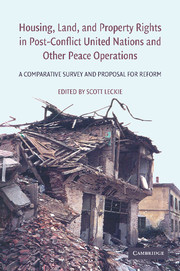 Housing, Land, and Property Rights in Post-Conflict United Nations and Other Peace Operations
Housing, Land, and Property Rights in Post-Conflict United Nations and Other Peace Operations Book contents
- Frontmatter
- Contents
- Contributors
- Acknowledgments
- Foreword by Dan Lewis
- I INTRODUCTION
- II CASE STUDIES
- 2 Stability, Justice, and Rights in the Wake of the Cold War: The Housing, Land, and Property Rights Legacy of the UN Transitional Authority in Cambodia
- 3 The Response of the United Nations Interim Administration Mission in Kosovo to Address Property Rights Challenges
- 4 Balancing Rights and Norms: Property Programming in East Timor, the Solomon Islands, and Bougainville
- 5 Housing, Land, and Property Restitution Rights in Afghanistan
- 6 Peacekeeping and HLP Rights in the Great Lakes Region of Africa: Burundi, Rwanda, and DR Congo
- 7 The Trouble with Iraq: Lessons from the Field on the Development of a Property Restitution System in “Post”-Conflict Circumstances
- 8 Sudan's Comprehensive Peace Agreement: An Opportunity for Coherently Addressing Housing, Land, and Property Issues?
- 9 The Impacts of UN Peace Operations on Local Housing Markets
- III CONCLUSIONS
- Index
6 - Peacekeeping and HLP Rights in the Great Lakes Region of Africa: Burundi, Rwanda, and DR Congo
Published online by Cambridge University Press: 15 July 2009
- Frontmatter
- Contents
- Contributors
- Acknowledgments
- Foreword by Dan Lewis
- I INTRODUCTION
- II CASE STUDIES
- 2 Stability, Justice, and Rights in the Wake of the Cold War: The Housing, Land, and Property Rights Legacy of the UN Transitional Authority in Cambodia
- 3 The Response of the United Nations Interim Administration Mission in Kosovo to Address Property Rights Challenges
- 4 Balancing Rights and Norms: Property Programming in East Timor, the Solomon Islands, and Bougainville
- 5 Housing, Land, and Property Restitution Rights in Afghanistan
- 6 Peacekeeping and HLP Rights in the Great Lakes Region of Africa: Burundi, Rwanda, and DR Congo
- 7 The Trouble with Iraq: Lessons from the Field on the Development of a Property Restitution System in “Post”-Conflict Circumstances
- 8 Sudan's Comprehensive Peace Agreement: An Opportunity for Coherently Addressing Housing, Land, and Property Issues?
- 9 The Impacts of UN Peace Operations on Local Housing Markets
- III CONCLUSIONS
- Index
Summary
Introduction
A variety of recent studies have revealed complex relationships between control over land (and land-based resources) and conflict. Combatants involved in conflict within states – by far the most significant kind of conflict today – often claim that unequal access to land is one of the causes of the violence. During conflict, land access is affected not just for belligerents, but for entire communities, who become targets of violence due to the “ethnicization” of conflict. And in post-conflict situations, the land and shelter needs of returning internally displaced populations (IDPs) and refugees must be carefully managed in order to avoid dangerous disputes and further violence. The types of interventions in the housing, land, and property (HLP) sector that are necessary and feasible change as the country emergences from conflict toward a more stable period of reconstruction.
This chapter looks specifically at Burundi, Rwanda, and the Democratic Republic of Congo (DRC; formerly Zaire). The three case-study countries are at different stages of post-conflict recovery, and a brief overview of recent events in the region follows.
An Overview of Recent Conflicts in the Great Lakes Region
Events in the core countries of the Great Lakes region have long been characterized by cross-border events and political “domino effects.” Due to constraints of space, the following section summarizes and simplifies recent events. Readers are therefore referred to other sources for more detailed accounts.
- Type
- Chapter
- Information
- Housing, Land, and Property Rights in Post-Conflict United Nations and Other Peace OperationsA Comparative Survey and Proposal for Reform, pp. 179 - 219Publisher: Cambridge University PressPrint publication year: 2008
- 2
- Cited by
